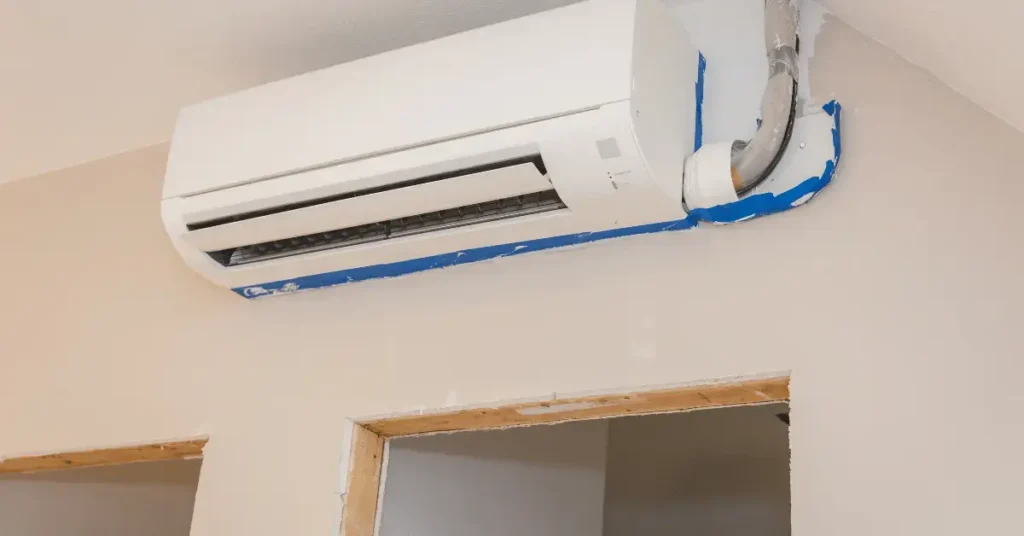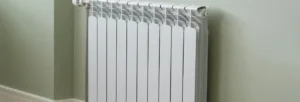Quick Answer: Ductless heating systems (mini-split heat pumps) are efficient, quiet, and ideal for zoned heating in Independence homes, but they cost more upfront and require routine filter cleaning. On average, they save 25–40% on monthly utility bills compared to older furnaces, especially during moderate Missouri winters.
Understanding Ductless Heating Systems
Ductless heating systems, also known as mini-split heat pumps, operate without ductwork. Each indoor unit connects to an outdoor compressor via refrigerant lines, delivering conditioned air directly to specific rooms. This setup is popular among Independence homeowners with older homes lacking ducts or room additions needing individual comfort control.
How Ductless Heating Works
A mini-split system moves heat rather than creating it. In winter, the outdoor unit extracts warmth from the outside air, even in cold weather, and transfers it inside through refrigerant lines. In summer, the process reverses for cooling.
This energy-transfer process makes ductless units significantly more efficient than gas furnaces or electric baseboards, particularly when temperatures hover between 30°F and 50°F, typical of Independence’s late-fall and early-spring climate.
Average Energy Costs in Independence, MO
| System Type | Average Monthly Operating Cost | Annual Energy Use | Energy Source | Ideal Use |
|---|---|---|---|---|
| Ductless Mini-Split Heat Pump | $45–$60/month | 4,500 kWh | Electricity | Zoned heating/cooling |
| Gas Furnace with Ducts | $70–$90/month | 600 therms | Natural Gas | Whole-home heating |
| Electric Baseboard | $90–$120/month | 8,500 kWh | Electricity | Supplemental heating |
| Space Heaters | $60–$100/month | 6,000 kWh | Electricity | Spot heating only |
Key Takeaway: Even with higher upfront costs, ductless systems often save $25–$40 monthly during Independence’s heating season due to reduced energy loss and precise zoning.
Advantages of Ductless Heating Systems
1. High Energy Efficiency
Traditional systems lose up to 30% of heat through ductwork. Ductless systems eliminate this loss, maintaining a Seasonal Energy Efficiency Ratio (SEER2) up to 25–35 and Heating Seasonal Performance Factor (HSPF) above 10.
If you’ve been wondering why your heating bill is so high, duct losses are often a major contributing factor. By eliminating ducts, ductless systems convert more energy directly into heating, which can significantly lower wasted heat and improve overall efficiency during colder months.
2. Zoned Temperature Control
Each indoor unit operates independently, allowing you to heat only occupied spaces. Independence homeowners often install separate zones for basements, bedrooms, and sunrooms, saving energy and improving comfort.
3. Easy Installation
Without ductwork, installation typically takes one day per zone. This makes it ideal for older homes or new additions. If you ever need expert help, a plumbing company that handles HVAC retrofits can manage the entire setup.
4. Cleaner Indoor Air
Since there are no ducts to trap dust or allergens, ductless systems promote cleaner air — a benefit during Missouri’s allergy seasons when pollen counts spike.
Disadvantages of Mini-Split Systems
1. Higher Upfront Cost
A single-zone mini-split costs $3,500–$5,000 installed; multi-zone systems can exceed $12,000. However, professional heating contractors can help you qualify for local utility rebates, reducing costs by up to 20%.
2. Aesthetic Concerns
Wall-mounted units are visible, which some homeowners dislike. Ceiling cassettes offer a more discreet option but cost slightly more.
3. Regular Maintenance
Ductless systems require monthly filter cleaning and annual coil inspections. Neglecting this can lead to reduced airflow and higher energy use.
4. Performance in Extreme Cold
While efficient down to 5°F, ductless systems may struggle below that point. Independence rarely sees prolonged sub-zero weather, but during rare cold snaps, homeowners may notice symptoms similar to a furnace blowing cold air or reduced heat output. In these situations, having backup heat, such as a gas fireplace, helps maintain comfort without overloading the system.
Quick Fixes for Common Issues
If your ductless system isn’t heating well, try these quick fixes before calling for service:
Clean or replace filters.
Check outdoor units for debris or snow buildup.
Ensure fan mode isn’t active — it circulates air but doesn’t heat.
Inspect remote settings for “Heat” mode instead of “Auto.”
If these steps don’t help, contact AC repair professionals in Independence for diagnostics.
Are Ductless Mini-Splits Worth It?
Yes, especially in Independence homes with older ductwork or new additions. They offer up to 40% savings on energy bills, reduce noise levels, and improve indoor air quality. However, homeowners with existing duct systems may find traditional HVAC upgrades more cost-effective.
When Ductless Heating Makes Sense in Independence
Best Scenarios
Homes without existing ductwork
Room additions or finished basements
Detached garages or workshops
Zoned heating for families with varying comfort preferences
Poor Fit Scenarios
Large, open homes requiring uniform temperature
Homes already equipped with efficient central systems
Expert Tip: Pair Ductless with Smart Controls
Using the right thermostat for your steam heating system or ductless setup ensures optimal temperature regulation and energy savings. Many mini-splits are Wi-Fi enabled for remote control, which can lower usage during peak hours when Independence Power & Light rates rise.
Are Mini-Splits Reliable?
Modern mini-splits from brands like Mitsubishi, Daikin, and LG last 15–20 years with proper maintenance. Most offer 10-year compressor warranties and 5-year part warranties, making them a dependable investment.
Advantages and Disadvantages at a Glance
| Category | Advantages | Disadvantages |
|---|---|---|
| Energy Efficiency | Reduces energy use by 25–40% | Efficiency drops below 5°F |
| Installation | Fast, minimal disruption | Higher upfront cost |
| Air Quality | Cleaner air, no ducts | Requires frequent filter cleaning |
| Noise Level | Whisper-quiet (20–25 dB) | Indoor units remain visible |
| Zoning | Individual room control | Multiple units raise cost |
| Maintenance | Simple monthly cleaning | Professional servicing once a year |
5 Tips to Maximize Ductless Efficiency
Clean filters monthly for optimal airflow.
Keep outdoor units clear of debris and snow.
Use inverter settings instead of full power for better temperature control.
Close doors between zones to maintain efficiency.
Schedule annual tune-ups with certified ductless air conditioning specialists.
How Well Do Mini-Splits Heat During Missouri Winters?
Mini-splits perform impressively well in Independence’s mild-to-moderate winters, maintaining efficiency down to 5°F. The average winter temperature of 34°F suits heat pump operation perfectly, meaning these systems rarely need supplemental heating except during occasional arctic fronts.
Comparing Ductless vs Traditional Systems
1. Comfort
Mini-splits deliver consistent comfort without the temperature swings common in gas furnaces.
2. Operating Cost
Expect monthly savings of $25–$40 compared to central forced-air systems.
3. Maintenance
Ductless systems require light monthly cleaning versus full duct inspections every two years.
4. Lifespan
Both systems last about 15–20 years, but ductless models maintain efficiency longer due to fewer moving parts.
Independence’s Climate Advantage
Independence sits in a humid continental zone, meaning moderate winters and hot, humid summers. This makes ductless mini-splits an ideal all-season solution, providing heating and cooling in one system, adapting automatically to temperature swings common in the Midwest.
If you’re exploring other home comfort options, remember that pairing a ductless system with a tankless water heater replacement can significantly improve household efficiency.
Environmental Benefits
By using heat transfer instead of fuel combustion, ductless systems cut carbon emissions by up to 50% compared to gas furnaces. This aligns with Missouri’s growing focus on energy conservation and rebate incentives from Independence Power & Light.
Ductless Mini-Split Pros and Cons Summary
Pros
Energy-efficient and cost-saving
Easy installation in any room
Zoned comfort control
Lower carbon footprint
Cons
Higher upfront cost
Regular filter maintenance
Visible indoor units
Reduced performance in sub-zero conditions
Quick Buying Guide
Before investing in a ductless system, consider these factors:
Home Size: Larger homes may need multiple indoor units.
Electrical Capacity: Confirm your panel can handle additional load.
Installer Experience: Always hire licensed, local specialists familiar with Independence’s building codes.
System Type: Choose between wall-mounted, ceiling cassette, or floor-mounted units.
Homeowners comparing tankless water heaters vs storage tank water heaters often follow similar reasoning — long-term efficiency wins over initial cost.
Maintenance Checklist
Inspect indoor air filters monthly.
Vacuum dust from coils gently.
Ensure condensate lines drain freely.
Have refrigerant levels checked annually.
Schedule seasonal maintenance with your local heating contractor.
Common Misconceptions
Myth: Ductless systems can’t handle cold winters.
Fact: Cold-climate mini-splits operate efficiently down to 5°F.Myth: Mini-splits are only for new homes.
Fact: They retrofit easily into older Independence homes.Myth: They cost more to run.
Fact: They use up to 40% less energy than ducted systems.
Safety Tip
If you notice a faint gas smell near your water heater, turn off the gas supply immediately and contact emergency services. Never confuse electrical heating odors with gas leaks.
Call for Expert Ductless Heating Solutions
For expert installation, maintenance, or consultation on ductless heating systems, call our team at (816) 945-2131. Our licensed specialists in Independence, MO provide same-day service, system design, and local expertise to keep your home efficient, quiet, and comfortable year-round.
Frequently Asked Questions About Ductless Heating Systems
What size mini-split system do I need for my Independence home?
A 1,200-sq-ft home typically needs a 24,000 BTU (2-ton) system, but local climate, insulation, and layout influence sizing. Always request a professional load calculation.
Can a ductless system replace my furnace entirely?
Yes, most models provide efficient heating year-round, but homeowners in rural areas with frequent power outages may still want a secondary heat source.
How long does ductless installation take?
Usually one day per indoor unit. A three-zone home averages two days from start to finish.
What are the best brands for ductless heating?
Top performers in Independence include Mitsubishi Electric, Daikin, and Fujitsu — all known for reliability and cold-weather performance.
Do ductless systems qualify for rebates in Independence?
Yes. Independence Power & Light offers rebates of $300–$800 per system for Energy Star-certified installations.
Are mini-splits cost-effective long-term?
Yes. Over 15 years, ductless systems typically save $4,000–$6,000 in utility bills compared to traditional systems in Missouri homes.
Do ductless AC units work for large homes?
Yes, but multi-zone systems are required. These use a single outdoor compressor to support up to eight indoor units.
Are mini-splits noisy?
Not at all. Most run at 20–25 decibels, quieter than a whisper.








